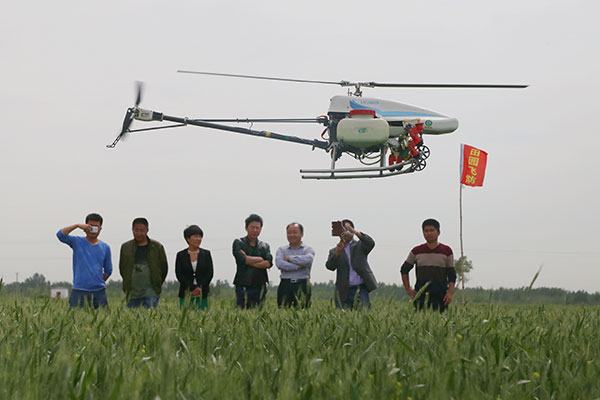Seeds of success planted online
By MENG JING (China Daily) Updated: 2015-08-11 08:37
|
 |
|
A drone is spraying crops with fertilizer. [Photo/China Daily] |
"At first, a lot of farmers questioned the quality of my products because I was selling them so cheap," the 28-year-old said. "But it is not too difficult to understand the reason for the price difference. I get my products direct from the producers or their dealers at national level.
"In the traditional way, prices of products soar as they change hands," he added. "The dealers at provincial, city, county and township levels all need to raise the price to make money."
Ma has seen his online Taobao store thrive in the past three years. His daily orders have surged from one or two when he first started to 300, with sales worth more than 100,000 yuan.
Yet his success is in stark contrast to what is happening at his father's traditional fertilizer store in Linyi city. There, sales are down to 3,000 yuan or even 2,000 yuan a day because he only sells his products to neighborhood farmers.
"No one in other parts of the country know about my father's store," Ma said. "And no one will fly over here to physically pick up their orders.
"But with e-commerce, I can send my products to anyone in the country via a courier service," he added. "All they need to do is place my orders on a smartphone or a computer."
Ma's online operation is just what the government is looking for.
At a regular meeting of the State Council in March, Premier Li Keqiang made it clear that it was crucial to modernize the agriculture industry, with technology playing a major role.
"The central government has so far allocated 3.7 billion yuan this year to support e-commerce development in central and western parts of China's rural area," Shen Danyang, spokesperson at the Ministry of Commerce, said last month. "Financial support will cover about 200 counties in 26 provinces. This will help farmers, create more jobs and increase incomes."
Half of China's 1.34 billion population live in villages, and at the end of 2010, 125 million were connected to the Internet, a report by the China Internet Network Information Center revealed. The figure has since climbed to 186 million by the end of June this year.
But more work still needs to be done to help farmers and merchants connect to the Web and boost their sales and incomes online.
Tang Lin, who comes from Biancang town in Jiangsu province, has set up a "service station", or small store, to help farmers order agricultural-related products online, such as pesticides and fertilizers.
"A lot of the farmers are not tech-savvy enough to shop online," he said. "So they often come to me for help. Gradually, I became a purchasing agent and now I make small money out of the business," he added, pointing out that most of the younger generation like him no longer farm themselves.
- 2015 China International Fair for Investment and Trade kicks off in Xiamen
- China's commodity imports robust in Jan-Aug period
- China stocks rebound 2.92%
- 2015 China box office already past 2014 total
- China foreign trade decline widens in August
- Interview: JP Morgan's senior executive bullish on China
- Innovation, development the focus for NZ mayors
- Lives of freelancers

















